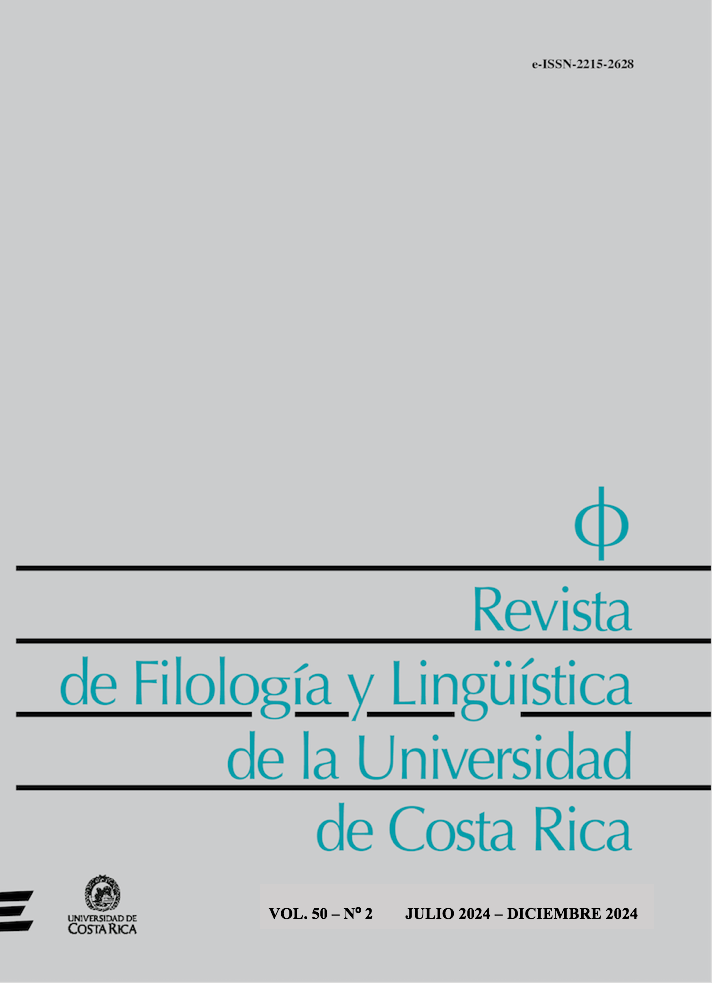Abstract
This research aims to investigate the syntactic representation of the perfect aspect. More specifically, we intend to verify the morphosyntactic realizations of universal perfect (UP), resultative perfect (ResP) and experiential perfect (ExP) associated to the past and to the indicative mood in Brazilian Portuguese (BP). For this purpose, five hours of spontaneous speech were analyzed and a gap-filling task was applied to 62 native speakers of BP. The results evidenced that UP is conveyed by the imperfective past and the auxiliary verb “estar” (‘to be’) in the imperfective past + gerund; ResP is conveyed by past perfect (with the auxiliary verbs “ter” (‘to have’) and “haver” (‘there to be’), simple past, past perfect simple and “acabar” (‘to finish’) in the past perfect compound with the auxiliary verb “ter” (‘to have’) + ‘de’ (‘of’) + infinitive; and ExP is conveyed by the past perfect compound with the auxiliary verbs “ter” (‘to have’) and “haver” (‘there to be’), simple past and past perfect simple. We discussed that the results corroborate Rodrigues and Martins’s (2019) proposal that there are three perfect phrases in the syntactic tree: Universal Perfect Phrase (UPerfP) to UP, Resultative Perfect Phrase (ResPerfP) to ResP, and Experiential Perfect Phrase (ExPerfP) to ExP.
References
Alexiadou, A., Rathert, M. & Von Stechow, A. (2003). Introduction: the modules of perfect constructions. Em A. Alexiadou, M. Rathert & A. Von Stechow (Orgs.), Perfect Explorations (pp. 5-38). Mouton de Gruyter.
Bowie, J., Wallis, S. & Aarts, B. (2013). The perfect in spoken British English. Em B. Aarts, J. Close, G. Leech & S. Wallis (Eds.), The Verb Phrase in English: Investigating Recent Language Change with Corpora (pp. 318–352). Cambridge University Press.
Callou, D. & de Avelar, J. O. (2021). Sobre ter e haver em construções existenciais: variação e mudança no português do Brasil. Gragoatá, 5(9), 85-100.
Cinque, G. (1999). Adverbs and functional heads: A cross-linguistic perspective. Oxford University Press.
Coan, M. (1997). Anterioridade a um ponto de referência passado: pretérito (mais-que-) perfeito. [Dissertação de Mestrado em Linguística, Universidade Federal de Santa Catarina].
Comrie, B. (1976). Aspect: An introduction to the study of verbal aspect and related problems (Vol. 2). Cambridge University Press.
Gomes, J. C. S. (2020). O comprometimento do aspecto perfect na Doença de Alzheimer [Dissertação de Mestrado em Linguística, Universidade Federal do Rio de Janeiro].
Gomes, J. C. S., Martins, A. L. & Rodrigues, F. C. (2021). The linguistic impairment of the perfect aspect in Alzheimer’s disease and logopenic primary progressive aphasia. Cadernos de Linguística, 2(4), e528-e528.
Gonçalves, C. A. V. (1993). Falara-se mais-que-perfeito: estudo presente do tempo pretérito. ALFA: Revista de Linguística, 37.
Hricsina, J. (2017). Evolução dos verbos auxiliares na língua portuguesa. Études romanes de Brno, (2), 165-184.
Iatridou, S., Anagnostopoulou, E. & Izvorski, R. (2003). Observations about the form and meaning of the perfect. Perfect explorations, 2, 153-204.
Jesus, J. L. D., Matos, A. C. D. S., Martins, A. L. & Nespoli, J. B. (2017). O aspecto 'perfect' no português do Brasil. Travessias interativas, 7(14), 511-526.
Matos, A. C. D. S. (2017). O aspecto perfect no português do Brasil: uma análise do tipo existencial. [Monografia de Graduação em Letras, Universidade Federal do Rio de Janeiro].
Medeiros, B. S., Pessôa, L. S., Martins, A. L. & Gomes, J. C. S. (2023). Morphological realizations of perfect associated with the future in brazilian portuguese. Lingüística y Literatura, (84), 154-184.
Mittwoch, A. (1988). Aspects of English aspect: on the interaction of perfect, progressive and durational phrases. Linguistics and philosophy, 203-254.
Nespoli, J. B. (2018). Representação mental do perfect e suas realizações nas línguas românicas: um estudo comparativo. [Tese de Doutorado em Linguística, Universidade Federal do Rio de Janeiro].
Novaes, C. V. & Nespoli, J. B. (2014). O traço aspectual de perfect e as suas realizações. Revista FSA (Centro Universitário Santo Agostinho), 11(1), 255-279.
Pancheva, R. (2003). The aspectual makeup of perfect participles and the interpretations of the perfect* roumyana pancheva. Perfect explorations, 2, 277.
Pollock, J. Y. (1989). Verb movement, universal grammar, and the structure of IP. Linguistic inquiry, 20(3), 365-424.
Reichenbach, H. (1947). Elements of symbolic logic. Free Press.
Rodrigues, N. P. S. & Martins, A. L. (2019). Evidências advindas da aquisição do português do Brasil para os tipos de 'perfect'. Revista Linguíʃtica, 15(3), 161-184.
Sant’Anna, A. A. (2019). Realizações morfológicas do perfect associado ao passado no português do
Brasil. Anais do III D-Ling.
Sant'Anna, A. A., Martins, A. L. & Gomes, J. C. S. (2019). A representação sintática do aspecto perfect: uma análise a partir de advérbios do português brasileiro. Caderno de Squibs: Temas em estudos formais da linguagem, 5(1), 84-95.
Sant'Anna, A. A., Martins, A. L. & Gomes, J. C. S. (2022). Resultado e experiência: leituras aspectuais a partir do ordenamento VP-advérbio “já” no português brasileiro. Línguas e Instrumentos Linguísticos, 25(50), 59-80.
##plugins.facebook.comentarios##

This work is licensed under a Creative Commons Attribution-NonCommercial-NoDerivatives 3.0 Unported License.


